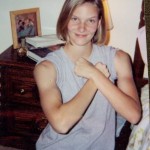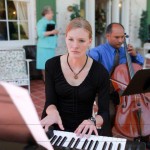Today is my 8th year wedding anniversary to Ethan and boy has it been a great adventure.
Some people know our “how we got together story,” but if you don’t, I’m going to indulge myself by telling you (because I’m biased and I think it’s a great story).
Our relationship began our very first day of college in our small orientation group. We were playing a get-to-know you game where each person has to take so many squares of toilet paper and tell that many things about themselves. Only, the reason for taking toilet paper was never explained ahead of time.
“I know what we’re doing,” Ethan blurted out in his bombastic way, and proceeded to take half the roll of toilet paper. I took three squares, still having no clue what was up.
As each person explained 3-4 things about themselves, Ethan rolled down his ream of toilet paper like a hard core couponer looking over a receipt, thinking she was overcharged. The bragging about himself went on and on. Let’s just say, I don’t usually dislike people automatically, but he was one of the handful in my life.
Let me take you back for a second and tell you the mentalities that we brought with us entering into college. I went into college distrusting all men and never wanting to date, or especially, marry. I would do my time, and go on my merry (single) way. Ethan went into college with the belief that women are meant to be led (told what to do) by men. I was a feminist, Ethan, a semi-chauvinist.
As college progressed, God softened my distrustful heart a bit and Ethan courted a girl for 2 years. It was an unhealthy relationship that slowly turned him into an egalitarian. And little by little it was coming to an end. And unbeknownst to me, I was one of the wedges in their relationship. I noticed more and more that his girlfriend would constantly give me the cold shoulder and had no idea why. Later on, Ethan shed a bit of light on it.
“I learned too late that if your girlfriend asks you who the prettiest girl on campus is, always say her.”
“What did you say?” I asked, unsurprised at his lack of girl knowledge. After all, he did grow up with only brothers.
“I said what I thought. ‘Anna Squires is the prettiest girl on campus.’”
“Never answer those questions,” I informed him with a smile and a shake of my head. “They’re traps. It’s like the ‘does this make me look fat’ question. That is also a trap. Never answer, but if you do, always give the answer they want to hear.”
So after the breakup, being a small school, rumors were spread and sides were taken. I never cared either way because being the individualist that I am, it was none of my business.
Towards the end of that spring semester, Ethan’s best friend Andrew died very suddenly. Ethan asked for prayer for Andrew’s family and for the first time, I could see that Ethan was trying hard to be strong and not cry and that he really cared about someone other than himself. I recognized the look in his eyes because it was the same look that I had. About a month after Ethan’s friend died, Mom tried to commit suicide and was in a coma for three days.
Summer came and went. Ethan was angry at God and trying to work through his faith, and I was trying to make things work at home with a Mom who was never quite the same. At the end of summer, he was resolved to quit wasting time and decide what he was looking for in a girl. It was his last year in college, so he wanted to make the most of it. He made a list—an actual list—with some very wonderful girls on it.
“And you were first on the list,” he later told me, “because you were beautiful, nice to everyone and smiled a lot. Shoot for the moon and all that.”
So the fall semester came, and Ethan asked for a haircut. I gave haircuts (I’m sure they weren’t great) to make a little extra money. He payed me and left me with 2 rubles because I’d told him of my desire to go to Russia one day. I thought that was very thoughtful, but no way was “him and me” ever happening. But just in case he had ideas about “us,” I would test him. No one ever passed this test. It was the let-me-tell-you-about-my-crazy-family test that made guys either feel sorry for me and try to rescue me or made them forever ignore me. I’ve given this test plenty because it scares people away like a charm. However, Ethan said, “that sucks” with an understanding look on his face. He wasn’t scared away and he knew I could and had always taken care of myself. Years later, we’ve come to understand that we both grew up with an abundance of similarities in our backgrounds—hence the understanding.
At the time, I was teaching music at a little school down the road and we had a Christmas pageant coming up. I had a dream several weeks before the play that the man I would marry would be there at the play. I woke up thinking what a weird dream that was because I was never going to get married. The night of the play came and before the play began, I looked around the room, the dream coming to mind. I saw no one at all that would interest me in the slightest. Whew. When the play was over, Ethan and my friend Kari came up to me. I swallowed, thinking Never will this happen, and said hello. But instead of just saying hi and bolting, he stayed for 2 hours and helped me clean up the church. He didn’t know this, but one of my love languages is acts of service (big time). When we finished, I couldn’t help but be blown away by his thoughtfulness.
Fast forward to January, when Ethan tricked me into going on a date. And let’s just say the date was hilariously disastrous. Have you seen the movie Hitch? It’s like that. We went to a coffee shop and ordered tea. He said he had to go to the bathroom and stayed in there for about an hour while I was left to sip my tea and look through some photos of a trip he’d taken recently. By the time he emerged, I had the pictures memorized in order. When he sat down, he looked at me and asked, “Are you okay? Your eyes look funny.” I went into the bathroom, looked in the mirror and saw that yes, my eyes were swollen. Apparently, I’m one of the handful of people allergic to a certain type of tea.
After a few more hilariously disastrous, adventurous dates, I found myself liking Ethan, but I was scared. I didn’t want to marry because I was afraid that I might have a marriage like my parents. I was afraid to lose my newly found independence. I didn’t think I could find a man with a will to equal mine. And all of my friends were against the relationship because of Ethan’s previous relationship. So we had the let’s just be friends talk. Basically, I told him that “we” were never going to happen. He smiled and was still nice to me. I’ve never had one of those conversations go so well. In his mind, he thought, “Challenge accepted.” In my mind, I thought it was over.
We continued to hang out and be friends, and slowly, I started to realize that I didn’t have to lose my freedom and that we were not our parents. I was still afraid to allow myself to trust someone, but he’d been perfectly honest with me as I had been with him. The night before graduation, we had the final talk. It went something like this:
Ethan (very nervous): I like you, etc….will you date me?
Me: “I’ve thought a lot about this and blah blah blah, pros and cons, you’re not at all my type, (sounding doubtful), so heck, why not? I’ll date you.”
And because this saga is far too long already, I’m just going to say, he loved me through my cold attachment issues while we were dating, and we both loved the freedom and complete honesty in our relationship. He got to be himself, and I got to be myself. To both our surprise, I was the first to say “I love you.” It totally caught him off guard, and he didn’t respond immediately. He was waiting until he proposed to say it, but I was tired of saying stupid things like “I like you a lot” when we both knew what we really meant. “I, I love you back,” he finally replied with a sweet smile.
We’ve been married 8 years today and I would not give up a single moment with this man. He is strong (inside and out), loving, thoughtful, gentle, intelligent, a lover of adventure, still likes to brag too much at times, is a joke stealer, and at times, shares my dark sense of humor. So, as I part, I’ll leave you with some of the loving things we say to each other that keep the marriage strong ;p
Ethan: Don’t worry. If you ever start gaining weight, I’ll just remind you that throwing up after every meal is an effective weight-loss tool.
Me: When I die naturally in my early 60’s, you need to remarry someone who doesn’t speak English so you’ll have someone to laugh at your jokes. And as long as you keep her green card valid, she’ll keep laughing until she learns English.










